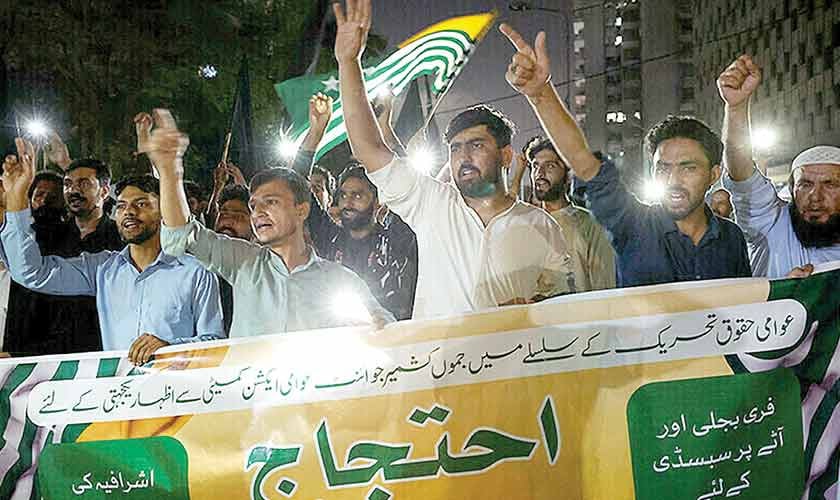**Landmark Agreement Between Pakistan Government and JAAC Ends Violent Protests in Azad Jammu and Kashmir**
In a pivotal development for Azad Jammu and Kashmir (AJK), the government of Pakistan and the Jammu and Kashmir Joint Awami Action Committee (JAAC) signed a landmark agreement on October 4, ending six days of violent protests that had claimed at least 10 lives. Dozens more were reported injured during the unrest.
Described by Prime Minister Shahbaz Sharif as a resolution that “buried the conspiracies,” the deal aims to address long-standing grievances related to economic hardship and governance failures. Whether this agreement proves a turning point or merely postpones a satisfactory resolution of the underlying conflicts will depend largely on its implementation.
### Details of the Agreement
Following two rounds of talks, a delegation led by Planning Minister Ahsan Iqbal, along with Kashmir Affairs Minister Amir Muqam and PPP leader Qamar Zaman Kaira, announced a 15-day mechanism to meet key demands raised by the protesters.
The agreement includes:
– Compensation for those killed in the violence, at par with that given to security personnel.
– Rs 1 million compensation for those injured during the clashes.
– A government job for one family member of each deceased protester, with appointments to be made within 20 days.
– Registration of cases under the Anti-Terrorism Act for acts of political violence.
– Formation of judicial commissions where appropriate.
### Background to the Unrest
The unrest, which paralysed the region, began on September 29 when the JAAC mobilised thousands across Azad Jammu and Kashmir. Led by Sardar Omer Nazir, Raja Amjad, Shaukat Nawaz Mir, and Anjum Zaman Awan, the committee presented a comprehensive 38-point charter of demands. These demands ranged from free education and healthcare to significant infrastructure projects.
At the heart of the movement were two deeply political issues: the discontinuation of elite privileges for top officials and the abolition of 12 legislative assembly seats reserved for refugees from Indian-administered Kashmir. JAAC leaders argue that this reserved seat bloc has monopolised development funds and political power in the region.
### Escalation and Response
What began as a largely peaceful strike quickly deteriorated into street violence. On October 1 and 2, clashes between rival protesters and police in Muzaffarabad and Dhirkot turned deadly. The use of gunfire and tear gas left at least 10 people dead and dozens injured.
The JAAC condemned the deployment of Pakistan Rangers, calling it unnecessary and unhelpful. Meanwhile, the Human Rights Commission of Pakistan criticised the excessive use of force and denounced the subsequent information blackout.
Pro-government rallies accused the JAAC activism of being part of a foreign-backed conspiracy, deepening mistrust and polarisation in the region.
### A Pattern of Persistent Mobilisation
This latest wave of mobilisation was neither spontaneous nor isolated. It marks the third major uprising in AJK within just two years and reflects a widening rift between the people and the government.
– **May 2024:** Widespread protests over electricity tariffs, taxation, and resource distribution forced the government to pledge reforms and a judicial review of elite privileges.
– **December 2023:** The JAAC led a campaign against the Peaceful Assembly and Public Order Ordinance, which sought to criminalise active dissent, ultimately forcing authorities to dilute its key provisions.
This sustained pattern of mobilisation has transformed public discontent into a broad political movement. What began as issue-specific demonstrations has evolved into a challenge to the power dynamics between AJK and Islamabad.
### JAAC’s Evolving Role
The JAAC now cuts across party lines and socio-economic divides, uniting citizens around demands for dignity, accountability, and democratic participation. The current unrest is part of a reckoning with decades of unresponsive governance and reflects the committee’s transformation from a pressure group into a decisive political actor capable of shaping state-society relations in the region.
### Underlying Structural Issues
A central driver of the mobilisation is the government’s repeated failure to deliver on promises. Successive leaders have announced reforms only to abandon or dilute them once public pressure subsided. This persistent gap between rhetoric and reality has eroded public trust and deepened the conviction that official institutions are unwilling or unable to address citizens’ concerns.
Beneath the immediate crisis lies a deep structural flaw in AJK’s political order. Despite its own institutions, the region’s administration functions largely as an extension of the government in Islamabad rather than as a truly representative body.
Major decisions—from resource allocation to development priorities—are taken in Islamabad, rarely considering local perspectives. This over-centralisation has weakened democratic accountability and entrenched political dependency.
The exclusion of local voices from policymaking compounds the problem. Policies and projects directly affecting communities are often conceived without meaningful consultation, leading to poor outcomes and reinforcing the perception that AJK’s people are governed rather than represented.
### The Path Forward
Until these structural imbalances are addressed, periodic protests are likely to persist, with each wave growing stronger than the last. Treating grassroots dissent as a security threat or foreign conspiracy may offer short-term political cover but fails to address the root causes driving public anger.
Instead, such tactics deepen mistrust and push the region further from stability.
At its core, the JAAC movement is about far more than subsidies and infrastructure. It reflects a long-simmering demand for dignity, accountability, and meaningful representation—demands that have gone unmet for decades.
Unless the root causes are addressed, the 15-day mechanism and compensation packages will remain mere stopgap measures.
### Conclusion
The stakes are higher than ever before. Addressing the crisis in AJK requires more than short-term firefighting; it demands a fundamental rethinking of how the region is governed.
If ignored, growing public pressure in AJK could inspire similar movements elsewhere. Coercion can suppress dissent temporarily, but only genuine, inclusive governance can resolve it permanently.
https://www.thenews.com.pk/tns/detail/1350029-addressing-grassroots-anxieties




